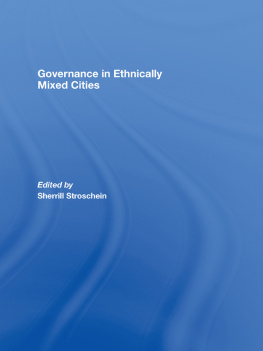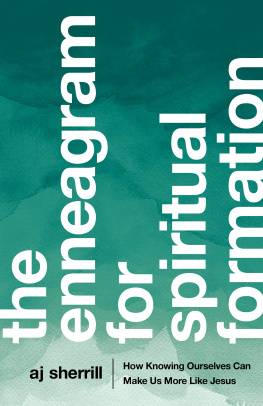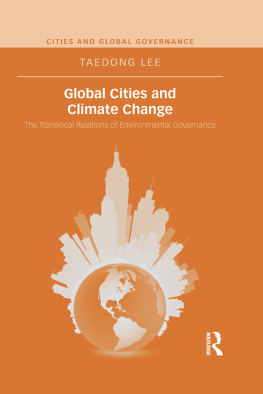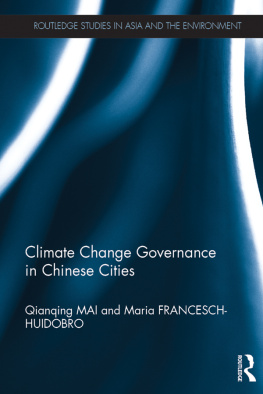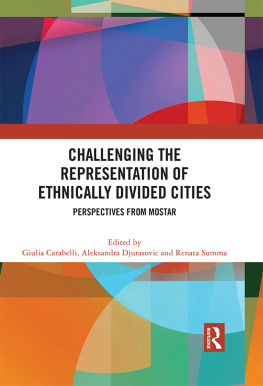Governance in Ethnically Mixed Cities
This collection of original essays breaks new ground by examining the dynamics of ethnic politics at the local level, rather than following in the footsteps of many previous studies which focus on the macropolitical level of states and nations.
Governance in Ethnically Mixed Cities is based on extensive fieldwork and local observation, providing perspectives from a range of academic disciplines including Political Science, Geography, and Anthropology. It covers a variety of geographic areas from the Middle East (Kirkuk, Haifa, and Tel Aviv-Jaffa) to Europe (Mostar, Bolzano, Toulouse, and Florence), Central Asia (Osh in Kyrgyzstan) and the United States (Durham, North Carolina). In spite of the variety of disciplinary approaches and geographic diversity of the case studies, the contributing authors uncover a number of common elements of local ethnopolitical dynamics in mixed cities: the power of informal institutions, the effect of numerical balances between groups on local politics, and the significance of local competition for material and symbolic resources. Each of these areas provides a promising avenue for foture research.
This book was previously published as a special issue of Ethnopolitics.
Dr. Sherrill Stroschein is a Lecturer in Politics in the Department of Political Science, University College London, and Programme Coordinator of the MSc in Democracy and Democratisation.
First published 2007 by Routledge
2 Park Square, Milton Park, Abingdon, Oxon, OX14 4RN
Simultaneously published in the USA and Canada
by Routledge
270 Madison Avenue, New York, NY 10016
Routledge is an imprint of the Taylor & Francis Group, an informa business.
2007 Edited by Sherrill Stroschein
Typeset in Times Roman by Techset Composition, Salisbury, UK
Printed and bound in Great Britain by MPG, Bodmin, Cornwall
All rights reserved. No part of this book may be reprinted or reproduced or utilised in any form or by any electronic, mechanical, or other means, now known or hereafter invented, including photocopying and recording, or in any information storage or retrieval system, without permission in writing from the publishers.
British Library Cataloguing in Publication Data
A catalogue record for this book is available from the British Library
Library of Congress Cataloging in Publication Data
ISBN10: 0-415-45126-4
ISBN13: 978-0-415-45126-0 hbk
SHERRILL STROSCHEIN
Department of Political Science, University College London, UK
Remember that we have to live here. So be careful what you do.
Such was my fathers admonishment when he learned that his teenage daughter was mustering a protest against religious instruction by the local religious majority in her public school. Not long before, a rumor had spread of two families in a neighboring town who had been forced to move elsewhere after challenging a similar issue. They had allegedly taken the matter to court and won, but were never spoken to again by their fellow localsa serious sanction given the skewed demographic balance. The informal punishment was far more powerful than the formal court victory, and the families had eventually packed up and left.1
Needless to say, I gave up on the protest.
However, the profound lesson remained with me: that formal rules set by the state to curb majorities in divisive local activities could be easily trumped by informal local realities, or informal institutions (Helmke & Levitsky, 2004). In mixed cities in which ethnic or religious cleavages are salient in politics, informal rules and norms serve as a powerful regulator of exchange. Moreover, at the local level, these norms can exert a greater influence over exchange than formal institutional structures. The following contributions demonstrate the local importance of informal institutions. This insight is one of several provided on the dynamics of ethnic politics at the city level, where individuals of different groups interact on a daily basis.2
Because informal norms of exchange are locally-generated, they can develop local particularities. A second primary insight that thus emerges is the fact that rules of interaction between individuals of different groups might differ significantly by locale, even among cities with similar ethnic or religious demographics. Third, in spite of these variations, structural factors such as demography, formal local governance institutions, and institutional relations between a city and the central state do play some role in constraining local parameters of action. A fourth insight relates to the allocation of resources. Power is not the only resource sought by different groups; material, linguistic, and symbolic resources also matter. Disputes over the distribution of resources at the local level are a common focal point of tension in any citybut in ethnically-mixed cities, these disputes often elide with ethnic cleavages.
These four insights are discussed in more detail below, with reference to evidence from the pieces in this volume and from the authors own fieldwork in mixed cities in east central Europe.3 Much theorizing on ethnic politics has focused on macro-level entities such as states and nations. However, these pieces show that the conclusions of these theories may in fact be inappropriate for understanding local dynamics of ethnic politics. Both normative theorizing on minority rights and social science work on ethnicity would do well to pay more attention to the de facto dynamics of ethnic interaction in local contexts.
The contributions in this volume represent both a diverse array of cities across geographic locations, and a variety of disciplinary angles: anthropology, geography, and political science, with many insights from sociology. These theoretical perspectives combine with an impressive depth of local knowledge and extensive ethnographic fieldwork. The contributions are clear and practical examples of a growing trend to examine the infrapo-litics (Scott, 1990) of ethnicitythe way in which it is actually practiced at the local level (Stroschein, 2001; Varshney, 2002; Petersen, 2001, 2002; Brubaker et al., 2006), and provide a corrective to a previous trend to emphasize larger entities. A step in a new direction of research into the politics of the local, many of the themes analyzed here present promising avenues for future research.
The Power of Informal Institutions
As defined by Hemke & Levitsky, informal institutions are socially shared rules, usually unwritten, that are created, communicated, and enforced outside of officially sanctioned channels (2004, p. 727). Institutions structure social interactions by influencing individual behavior, whether formal or informal. However, while the presence of formal institutions is more easily visible to observers, the influences of informal institutions can go undetected, particularly in studies that overlook local-level interactions. In-depth observations of political life at the city level thus holds great promise for advancing our understanding of informal institutions. In turn, the conceptual framework of informal institutions holds great promise for understanding how ethnic politics is actually practiced at the local level.
Informal institutions may take a variety of different forms: horizontal networks, patronage networks or norms of interaction (Putnam, 1993; Stark & Bruszt, 1998; Chandra, 2004; Helmke & Levitsky, 2004; Ledeneva, 2006). Like formal institutions and bureaucracies, they provide means of allocating resources and getting things done; functions that are typically associated with formal institutions and bureaucracies. However, informal institutions stand in stark contrast to the structure of rational and routinized formal bureaucracies as outlined by Max Weber, which serves as the foundation of much standard work on administrative structures. In the Weberian understanding of bureaucracies, well-defined rules are applied equally and transparently to individuals regardless of their social position. A rational and routinized bureaucracy thus de-personalizes individual interactions with state or city institutions. In this way, it serves a crucial role in the modernizing project (Weber, 1946). In contrast, patronage networks and unwritten rules and norms tend to be viewed by theorists and practitioners as hindrances to the establishment of successful states or city administrations, as ones placement in a network tends to determine access to resources (Granovetter, 1985; Tilly, 1998; Petersen, 2001). While the strong importance of networks for access can indeed violate notions of equality, networks need not always work against formal institutions. As noted by Helmke & Levitsky, informal institutions may sometimes provide support for formal institutions. They outline a typology of various potential relationships between formal and informal institutions, including both positive and negative interactions (Helmke & Levitsky, 2004, p. 728).

